University Seminar Report: Social Responsibility of Business (BUS3001)
VerifiedAdded on 2022/12/30
|12
|3934
|23
Report
AI Summary
This student-led seminar report, prepared for a BUS3001 module, delves into the critical aspects of social responsibility in business. The report examines the impact of MBA education on ethical practices and the prevalence of corporate scandals, suggesting that a focus on profitability over moral responsibility can lead to unethical behavior. It explores the concept of whistleblowing, differentiating between ethical and unethical applications, and analyzes its role in preventing fraud and addressing employee concerns. The report further discusses the importance of corporate social responsibility in building a positive brand image and fostering a healthy work environment, emphasizing the need for companies to prioritize employee well-being and implement ethical management practices to mitigate risks and promote sustainable business conduct. The report also explores the education system in MBA programs and suggests improvements to promote ethical behavior in the workplace. The report is divided into three parts: an introduction to social responsibility, a discussion of whistleblowing, and a reflective statement.
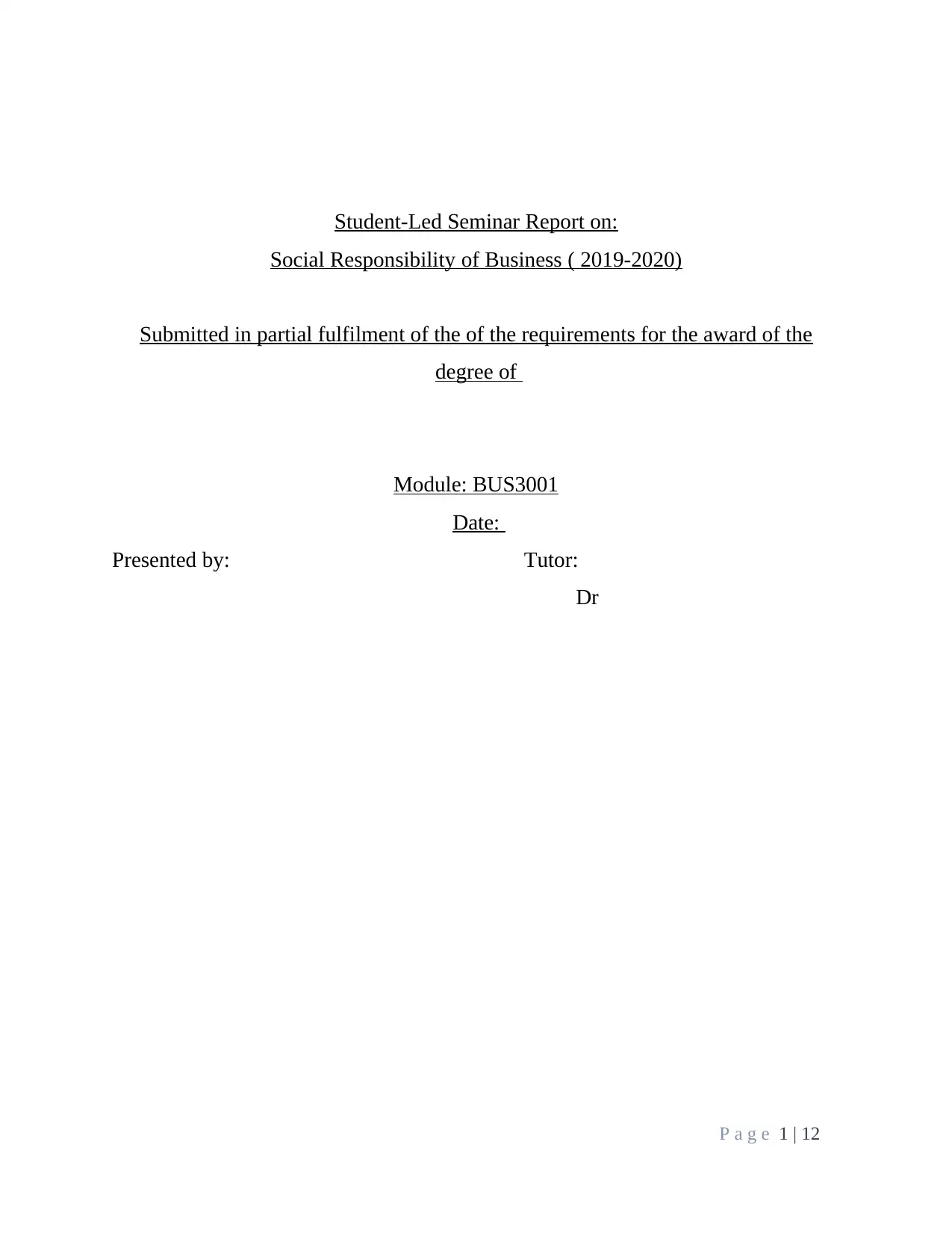
Student-Led Seminar Report on:
Social Responsibility of Business ( 2019-2020)
Submitted in partial fulfilment of the of the requirements for the award of the
degree of
Module: BUS3001
Date:
Presented by: Tutor:
Dr
P a g e 1 | 12
Social Responsibility of Business ( 2019-2020)
Submitted in partial fulfilment of the of the requirements for the award of the
degree of
Module: BUS3001
Date:
Presented by: Tutor:
Dr
P a g e 1 | 12
Paraphrase This Document
Need a fresh take? Get an instant paraphrase of this document with our AI Paraphraser
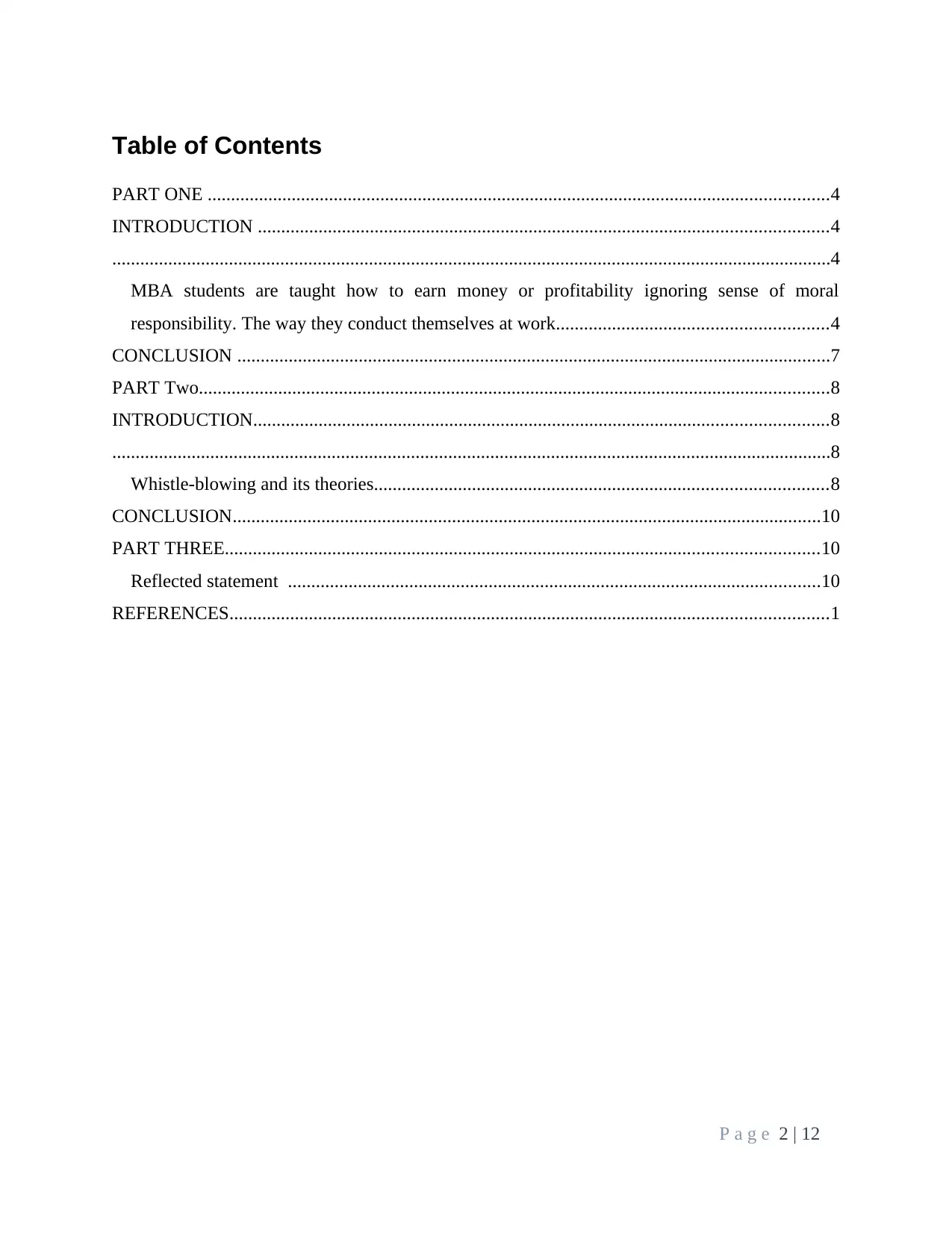
Table of Contents
PART ONE .....................................................................................................................................4
INTRODUCTION ..........................................................................................................................4
..........................................................................................................................................................4
MBA students are taught how to earn money or profitability ignoring sense of moral
responsibility. The way they conduct themselves at work..........................................................4
CONCLUSION ...............................................................................................................................7
PART Two.......................................................................................................................................8
INTRODUCTION...........................................................................................................................8
..........................................................................................................................................................8
Whistle-blowing and its theories.................................................................................................8
CONCLUSION..............................................................................................................................10
PART THREE...............................................................................................................................10
Reflected statement ..................................................................................................................10
REFERENCES................................................................................................................................1
P a g e 2 | 12
PART ONE .....................................................................................................................................4
INTRODUCTION ..........................................................................................................................4
..........................................................................................................................................................4
MBA students are taught how to earn money or profitability ignoring sense of moral
responsibility. The way they conduct themselves at work..........................................................4
CONCLUSION ...............................................................................................................................7
PART Two.......................................................................................................................................8
INTRODUCTION...........................................................................................................................8
..........................................................................................................................................................8
Whistle-blowing and its theories.................................................................................................8
CONCLUSION..............................................................................................................................10
PART THREE...............................................................................................................................10
Reflected statement ..................................................................................................................10
REFERENCES................................................................................................................................1
P a g e 2 | 12
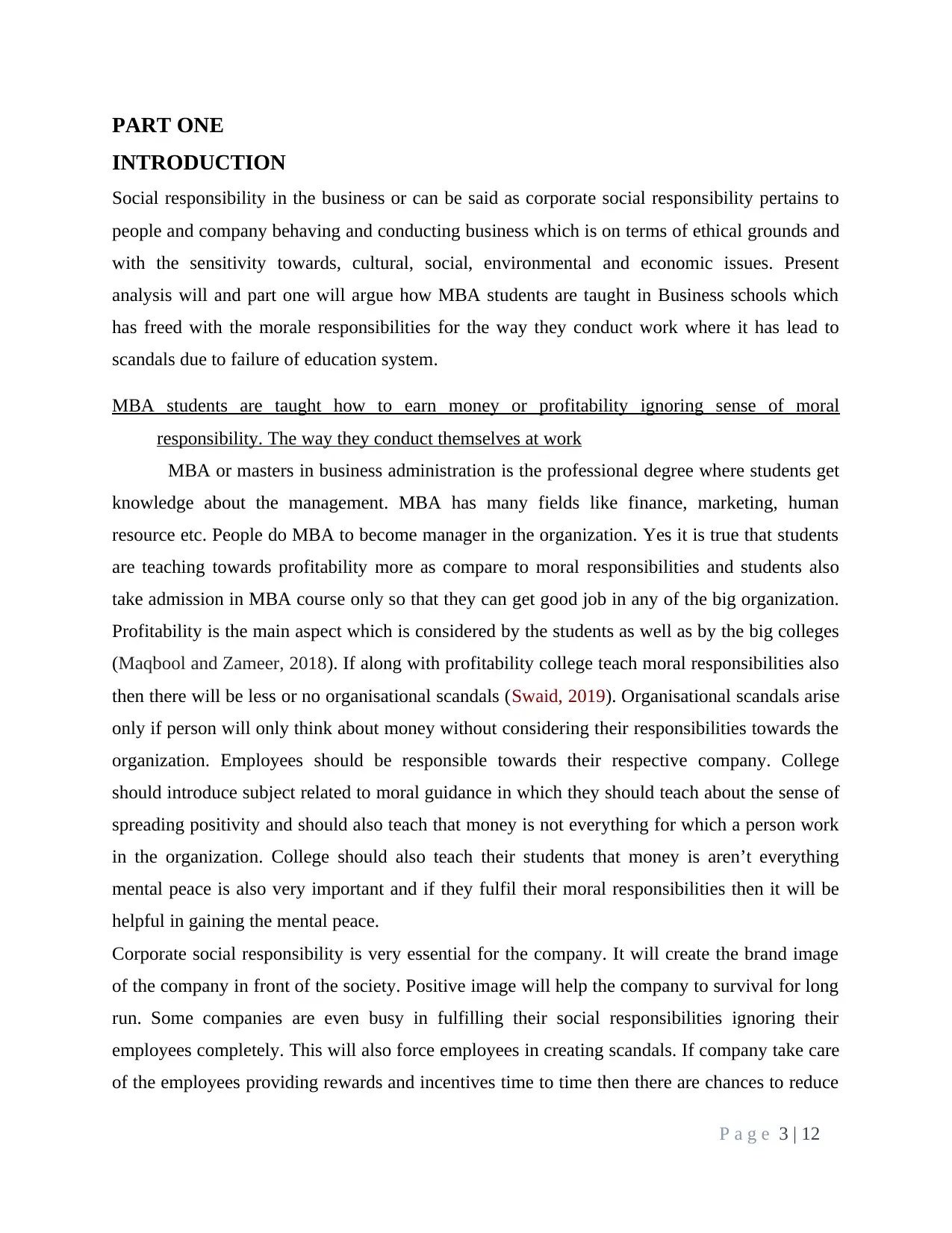
PART ONE
INTRODUCTION
Social responsibility in the business or can be said as corporate social responsibility pertains to
people and company behaving and conducting business which is on terms of ethical grounds and
with the sensitivity towards, cultural, social, environmental and economic issues. Present
analysis will and part one will argue how MBA students are taught in Business schools which
has freed with the morale responsibilities for the way they conduct work where it has lead to
scandals due to failure of education system.
MBA students are taught how to earn money or profitability ignoring sense of moral
responsibility. The way they conduct themselves at work
MBA or masters in business administration is the professional degree where students get
knowledge about the management. MBA has many fields like finance, marketing, human
resource etc. People do MBA to become manager in the organization. Yes it is true that students
are teaching towards profitability more as compare to moral responsibilities and students also
take admission in MBA course only so that they can get good job in any of the big organization.
Profitability is the main aspect which is considered by the students as well as by the big colleges
(Maqbool and Zameer, 2018). If along with profitability college teach moral responsibilities also
then there will be less or no organisational scandals (Swaid, 2019). Organisational scandals arise
only if person will only think about money without considering their responsibilities towards the
organization. Employees should be responsible towards their respective company. College
should introduce subject related to moral guidance in which they should teach about the sense of
spreading positivity and should also teach that money is not everything for which a person work
in the organization. College should also teach their students that money is aren’t everything
mental peace is also very important and if they fulfil their moral responsibilities then it will be
helpful in gaining the mental peace.
Corporate social responsibility is very essential for the company. It will create the brand image
of the company in front of the society. Positive image will help the company to survival for long
run. Some companies are even busy in fulfilling their social responsibilities ignoring their
employees completely. This will also force employees in creating scandals. If company take care
of the employees providing rewards and incentives time to time then there are chances to reduce
P a g e 3 | 12
INTRODUCTION
Social responsibility in the business or can be said as corporate social responsibility pertains to
people and company behaving and conducting business which is on terms of ethical grounds and
with the sensitivity towards, cultural, social, environmental and economic issues. Present
analysis will and part one will argue how MBA students are taught in Business schools which
has freed with the morale responsibilities for the way they conduct work where it has lead to
scandals due to failure of education system.
MBA students are taught how to earn money or profitability ignoring sense of moral
responsibility. The way they conduct themselves at work
MBA or masters in business administration is the professional degree where students get
knowledge about the management. MBA has many fields like finance, marketing, human
resource etc. People do MBA to become manager in the organization. Yes it is true that students
are teaching towards profitability more as compare to moral responsibilities and students also
take admission in MBA course only so that they can get good job in any of the big organization.
Profitability is the main aspect which is considered by the students as well as by the big colleges
(Maqbool and Zameer, 2018). If along with profitability college teach moral responsibilities also
then there will be less or no organisational scandals (Swaid, 2019). Organisational scandals arise
only if person will only think about money without considering their responsibilities towards the
organization. Employees should be responsible towards their respective company. College
should introduce subject related to moral guidance in which they should teach about the sense of
spreading positivity and should also teach that money is not everything for which a person work
in the organization. College should also teach their students that money is aren’t everything
mental peace is also very important and if they fulfil their moral responsibilities then it will be
helpful in gaining the mental peace.
Corporate social responsibility is very essential for the company. It will create the brand image
of the company in front of the society. Positive image will help the company to survival for long
run. Some companies are even busy in fulfilling their social responsibilities ignoring their
employees completely. This will also force employees in creating scandals. If company take care
of the employees providing rewards and incentives time to time then there are chances to reduce
P a g e 3 | 12
⊘ This is a preview!⊘
Do you want full access?
Subscribe today to unlock all pages.

Trusted by 1+ million students worldwide
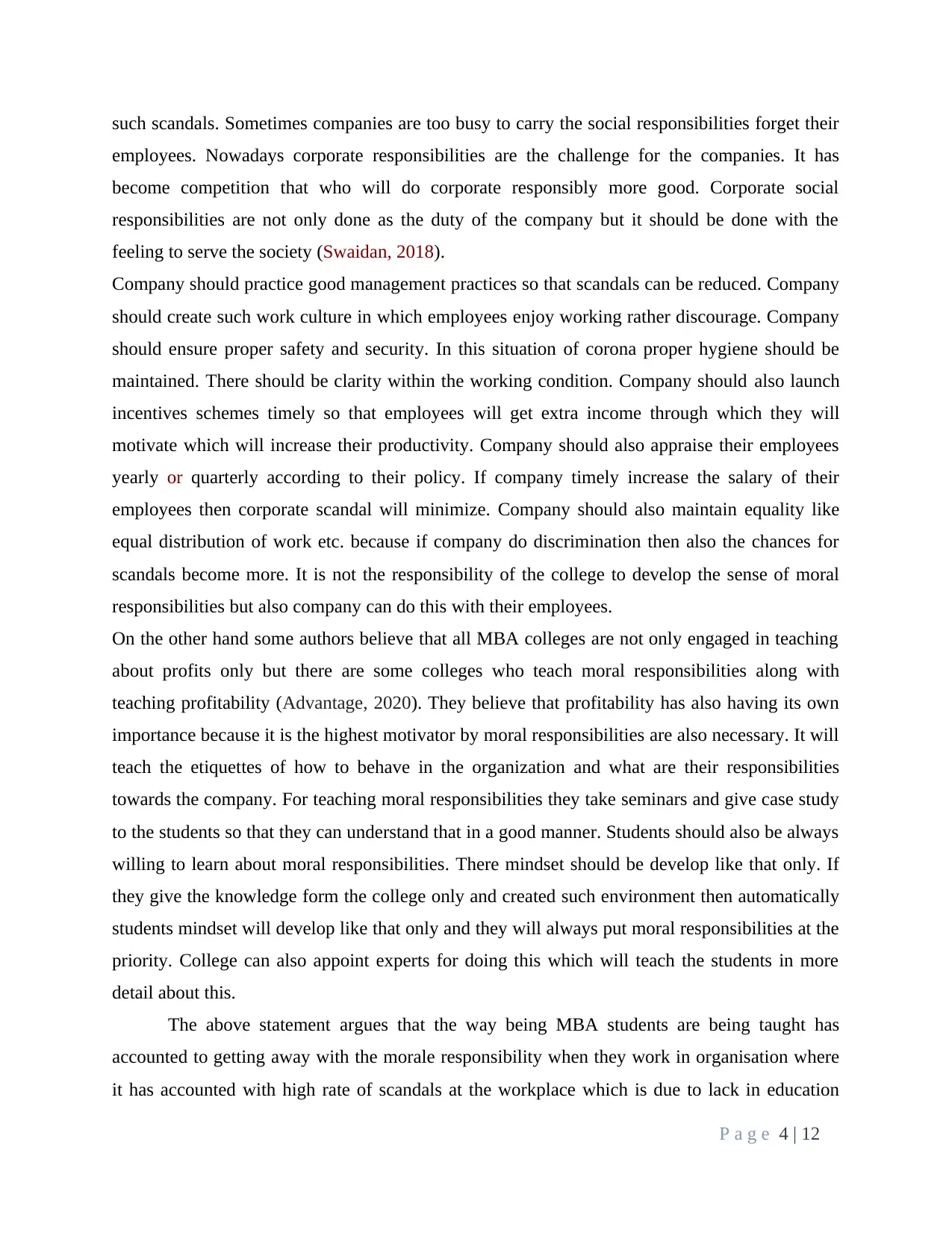
such scandals. Sometimes companies are too busy to carry the social responsibilities forget their
employees. Nowadays corporate responsibilities are the challenge for the companies. It has
become competition that who will do corporate responsibly more good. Corporate social
responsibilities are not only done as the duty of the company but it should be done with the
feeling to serve the society (Swaidan, 2018).
Company should practice good management practices so that scandals can be reduced. Company
should create such work culture in which employees enjoy working rather discourage. Company
should ensure proper safety and security. In this situation of corona proper hygiene should be
maintained. There should be clarity within the working condition. Company should also launch
incentives schemes timely so that employees will get extra income through which they will
motivate which will increase their productivity. Company should also appraise their employees
yearly or quarterly according to their policy. If company timely increase the salary of their
employees then corporate scandal will minimize. Company should also maintain equality like
equal distribution of work etc. because if company do discrimination then also the chances for
scandals become more. It is not the responsibility of the college to develop the sense of moral
responsibilities but also company can do this with their employees.
On the other hand some authors believe that all MBA colleges are not only engaged in teaching
about profits only but there are some colleges who teach moral responsibilities along with
teaching profitability (Advantage, 2020). They believe that profitability has also having its own
importance because it is the highest motivator by moral responsibilities are also necessary. It will
teach the etiquettes of how to behave in the organization and what are their responsibilities
towards the company. For teaching moral responsibilities they take seminars and give case study
to the students so that they can understand that in a good manner. Students should also be always
willing to learn about moral responsibilities. There mindset should be develop like that only. If
they give the knowledge form the college only and created such environment then automatically
students mindset will develop like that only and they will always put moral responsibilities at the
priority. College can also appoint experts for doing this which will teach the students in more
detail about this.
The above statement argues that the way being MBA students are being taught has
accounted to getting away with the morale responsibility when they work in organisation where
it has accounted with high rate of scandals at the workplace which is due to lack in education
P a g e 4 | 12
employees. Nowadays corporate responsibilities are the challenge for the companies. It has
become competition that who will do corporate responsibly more good. Corporate social
responsibilities are not only done as the duty of the company but it should be done with the
feeling to serve the society (Swaidan, 2018).
Company should practice good management practices so that scandals can be reduced. Company
should create such work culture in which employees enjoy working rather discourage. Company
should ensure proper safety and security. In this situation of corona proper hygiene should be
maintained. There should be clarity within the working condition. Company should also launch
incentives schemes timely so that employees will get extra income through which they will
motivate which will increase their productivity. Company should also appraise their employees
yearly or quarterly according to their policy. If company timely increase the salary of their
employees then corporate scandal will minimize. Company should also maintain equality like
equal distribution of work etc. because if company do discrimination then also the chances for
scandals become more. It is not the responsibility of the college to develop the sense of moral
responsibilities but also company can do this with their employees.
On the other hand some authors believe that all MBA colleges are not only engaged in teaching
about profits only but there are some colleges who teach moral responsibilities along with
teaching profitability (Advantage, 2020). They believe that profitability has also having its own
importance because it is the highest motivator by moral responsibilities are also necessary. It will
teach the etiquettes of how to behave in the organization and what are their responsibilities
towards the company. For teaching moral responsibilities they take seminars and give case study
to the students so that they can understand that in a good manner. Students should also be always
willing to learn about moral responsibilities. There mindset should be develop like that only. If
they give the knowledge form the college only and created such environment then automatically
students mindset will develop like that only and they will always put moral responsibilities at the
priority. College can also appoint experts for doing this which will teach the students in more
detail about this.
The above statement argues that the way being MBA students are being taught has
accounted to getting away with the morale responsibility when they work in organisation where
it has accounted with high rate of scandals at the workplace which is due to lack in education
P a g e 4 | 12
Paraphrase This Document
Need a fresh take? Get an instant paraphrase of this document with our AI Paraphraser
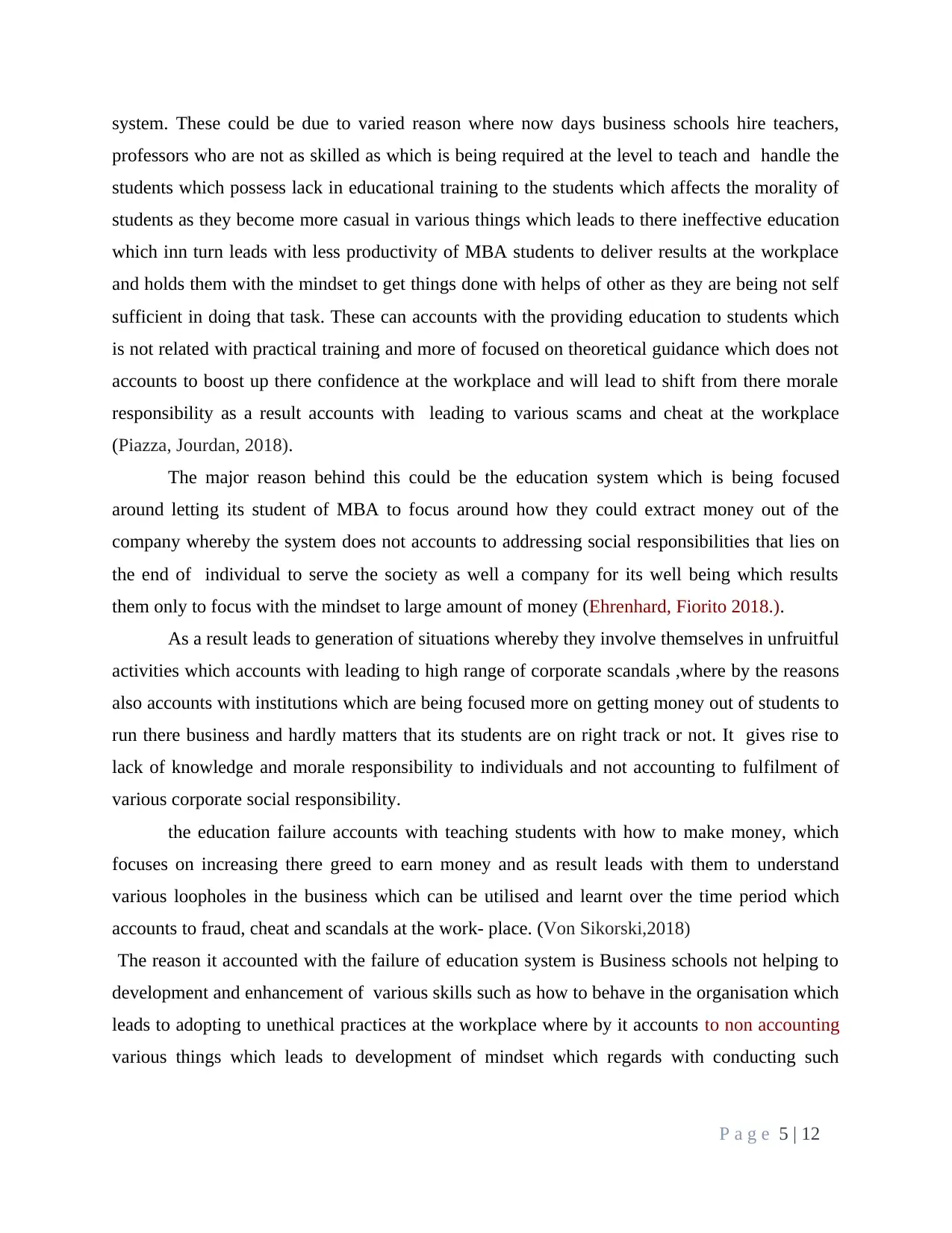
system. These could be due to varied reason where now days business schools hire teachers,
professors who are not as skilled as which is being required at the level to teach and handle the
students which possess lack in educational training to the students which affects the morality of
students as they become more casual in various things which leads to there ineffective education
which inn turn leads with less productivity of MBA students to deliver results at the workplace
and holds them with the mindset to get things done with helps of other as they are being not self
sufficient in doing that task. These can accounts with the providing education to students which
is not related with practical training and more of focused on theoretical guidance which does not
accounts to boost up there confidence at the workplace and will lead to shift from there morale
responsibility as a result accounts with leading to various scams and cheat at the workplace
(Piazza, Jourdan, 2018).
The major reason behind this could be the education system which is being focused
around letting its student of MBA to focus around how they could extract money out of the
company whereby the system does not accounts to addressing social responsibilities that lies on
the end of individual to serve the society as well a company for its well being which results
them only to focus with the mindset to large amount of money (Ehrenhard, Fiorito 2018.).
As a result leads to generation of situations whereby they involve themselves in unfruitful
activities which accounts with leading to high range of corporate scandals ,where by the reasons
also accounts with institutions which are being focused more on getting money out of students to
run there business and hardly matters that its students are on right track or not. It gives rise to
lack of knowledge and morale responsibility to individuals and not accounting to fulfilment of
various corporate social responsibility.
the education failure accounts with teaching students with how to make money, which
focuses on increasing there greed to earn money and as result leads with them to understand
various loopholes in the business which can be utilised and learnt over the time period which
accounts to fraud, cheat and scandals at the work- place. (Von Sikorski,2018)
The reason it accounted with the failure of education system is Business schools not helping to
development and enhancement of various skills such as how to behave in the organisation which
leads to adopting to unethical practices at the workplace where by it accounts to non accounting
various things which leads to development of mindset which regards with conducting such
P a g e 5 | 12
professors who are not as skilled as which is being required at the level to teach and handle the
students which possess lack in educational training to the students which affects the morality of
students as they become more casual in various things which leads to there ineffective education
which inn turn leads with less productivity of MBA students to deliver results at the workplace
and holds them with the mindset to get things done with helps of other as they are being not self
sufficient in doing that task. These can accounts with the providing education to students which
is not related with practical training and more of focused on theoretical guidance which does not
accounts to boost up there confidence at the workplace and will lead to shift from there morale
responsibility as a result accounts with leading to various scams and cheat at the workplace
(Piazza, Jourdan, 2018).
The major reason behind this could be the education system which is being focused
around letting its student of MBA to focus around how they could extract money out of the
company whereby the system does not accounts to addressing social responsibilities that lies on
the end of individual to serve the society as well a company for its well being which results
them only to focus with the mindset to large amount of money (Ehrenhard, Fiorito 2018.).
As a result leads to generation of situations whereby they involve themselves in unfruitful
activities which accounts with leading to high range of corporate scandals ,where by the reasons
also accounts with institutions which are being focused more on getting money out of students to
run there business and hardly matters that its students are on right track or not. It gives rise to
lack of knowledge and morale responsibility to individuals and not accounting to fulfilment of
various corporate social responsibility.
the education failure accounts with teaching students with how to make money, which
focuses on increasing there greed to earn money and as result leads with them to understand
various loopholes in the business which can be utilised and learnt over the time period which
accounts to fraud, cheat and scandals at the work- place. (Von Sikorski,2018)
The reason it accounted with the failure of education system is Business schools not helping to
development and enhancement of various skills such as how to behave in the organisation which
leads to adopting to unethical practices at the workplace where by it accounts to non accounting
various things which leads to development of mindset which regards with conducting such
P a g e 5 | 12
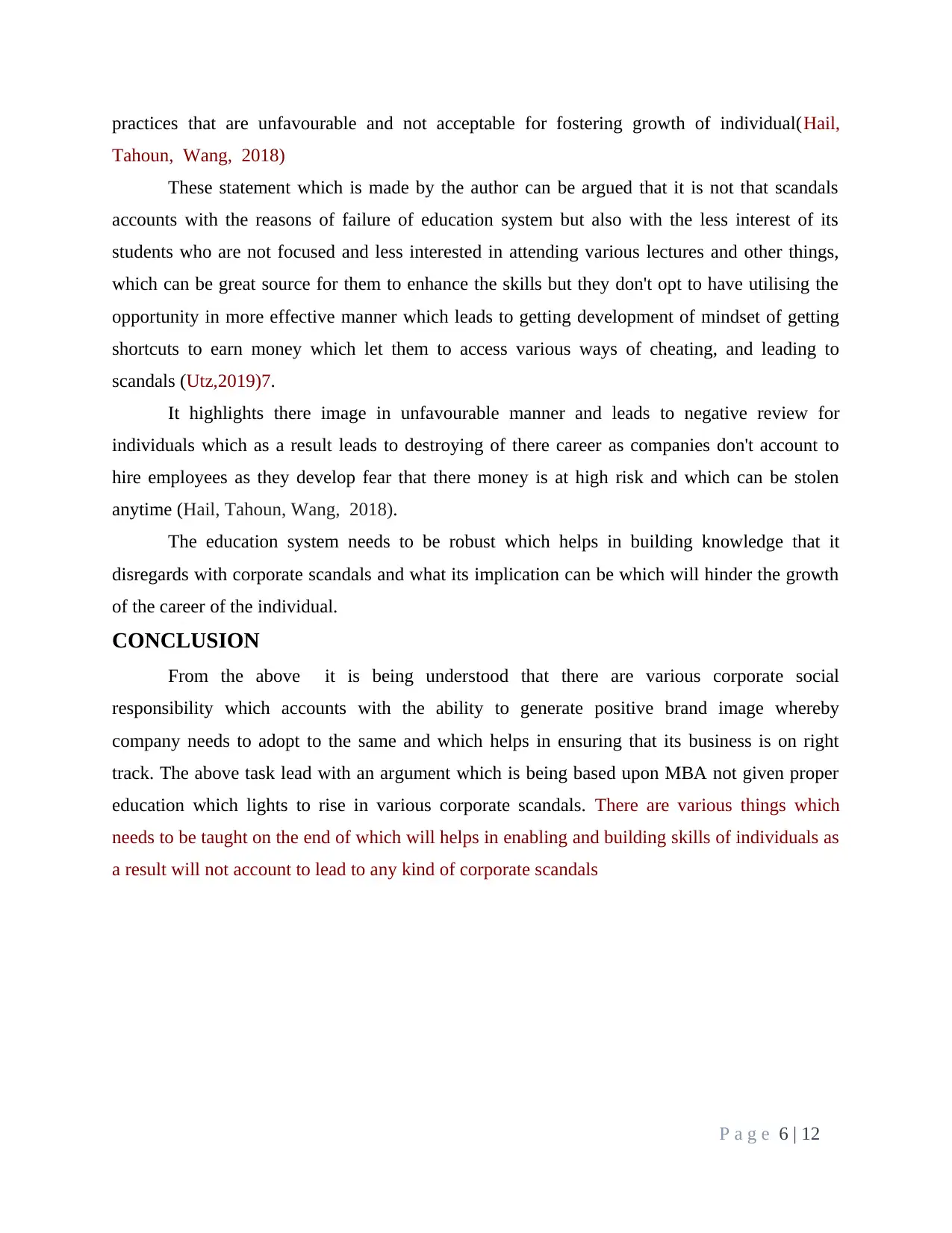
practices that are unfavourable and not acceptable for fostering growth of individual(Hail,
Tahoun, Wang, 2018)
These statement which is made by the author can be argued that it is not that scandals
accounts with the reasons of failure of education system but also with the less interest of its
students who are not focused and less interested in attending various lectures and other things,
which can be great source for them to enhance the skills but they don't opt to have utilising the
opportunity in more effective manner which leads to getting development of mindset of getting
shortcuts to earn money which let them to access various ways of cheating, and leading to
scandals (Utz,2019)7.
It highlights there image in unfavourable manner and leads to negative review for
individuals which as a result leads to destroying of there career as companies don't account to
hire employees as they develop fear that there money is at high risk and which can be stolen
anytime (Hail, Tahoun, Wang, 2018).
The education system needs to be robust which helps in building knowledge that it
disregards with corporate scandals and what its implication can be which will hinder the growth
of the career of the individual.
CONCLUSION
From the above it is being understood that there are various corporate social
responsibility which accounts with the ability to generate positive brand image whereby
company needs to adopt to the same and which helps in ensuring that its business is on right
track. The above task lead with an argument which is being based upon MBA not given proper
education which lights to rise in various corporate scandals. There are various things which
needs to be taught on the end of which will helps in enabling and building skills of individuals as
a result will not account to lead to any kind of corporate scandals
P a g e 6 | 12
Tahoun, Wang, 2018)
These statement which is made by the author can be argued that it is not that scandals
accounts with the reasons of failure of education system but also with the less interest of its
students who are not focused and less interested in attending various lectures and other things,
which can be great source for them to enhance the skills but they don't opt to have utilising the
opportunity in more effective manner which leads to getting development of mindset of getting
shortcuts to earn money which let them to access various ways of cheating, and leading to
scandals (Utz,2019)7.
It highlights there image in unfavourable manner and leads to negative review for
individuals which as a result leads to destroying of there career as companies don't account to
hire employees as they develop fear that there money is at high risk and which can be stolen
anytime (Hail, Tahoun, Wang, 2018).
The education system needs to be robust which helps in building knowledge that it
disregards with corporate scandals and what its implication can be which will hinder the growth
of the career of the individual.
CONCLUSION
From the above it is being understood that there are various corporate social
responsibility which accounts with the ability to generate positive brand image whereby
company needs to adopt to the same and which helps in ensuring that its business is on right
track. The above task lead with an argument which is being based upon MBA not given proper
education which lights to rise in various corporate scandals. There are various things which
needs to be taught on the end of which will helps in enabling and building skills of individuals as
a result will not account to lead to any kind of corporate scandals
P a g e 6 | 12
⊘ This is a preview!⊘
Do you want full access?
Subscribe today to unlock all pages.

Trusted by 1+ million students worldwide
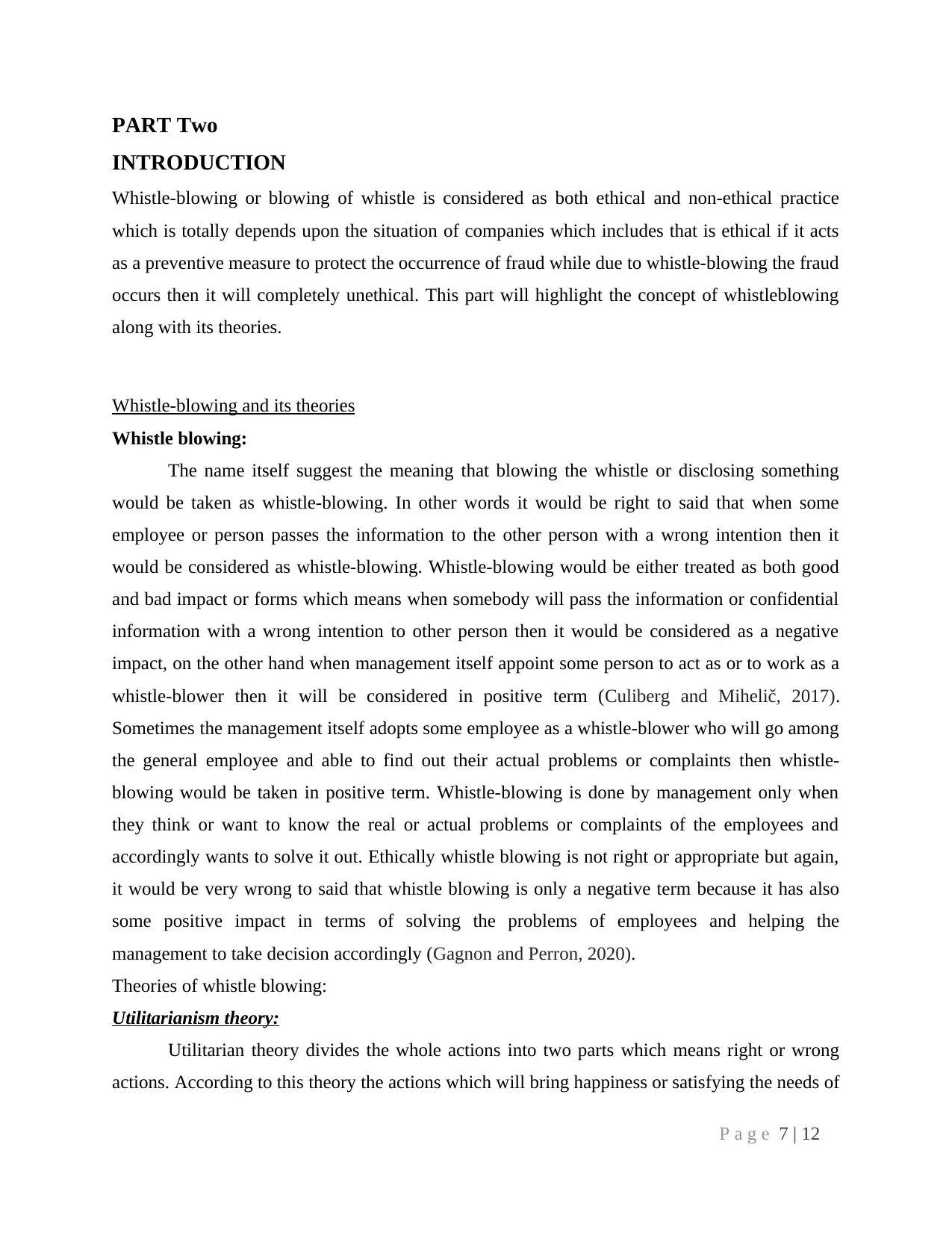
PART Two
INTRODUCTION
Whistle-blowing or blowing of whistle is considered as both ethical and non-ethical practice
which is totally depends upon the situation of companies which includes that is ethical if it acts
as a preventive measure to protect the occurrence of fraud while due to whistle-blowing the fraud
occurs then it will completely unethical. This part will highlight the concept of whistleblowing
along with its theories.
Whistle-blowing and its theories
Whistle blowing:
The name itself suggest the meaning that blowing the whistle or disclosing something
would be taken as whistle-blowing. In other words it would be right to said that when some
employee or person passes the information to the other person with a wrong intention then it
would be considered as whistle-blowing. Whistle-blowing would be either treated as both good
and bad impact or forms which means when somebody will pass the information or confidential
information with a wrong intention to other person then it would be considered as a negative
impact, on the other hand when management itself appoint some person to act as or to work as a
whistle-blower then it will be considered in positive term (Culiberg and Mihelič, 2017).
Sometimes the management itself adopts some employee as a whistle-blower who will go among
the general employee and able to find out their actual problems or complaints then whistle-
blowing would be taken in positive term. Whistle-blowing is done by management only when
they think or want to know the real or actual problems or complaints of the employees and
accordingly wants to solve it out. Ethically whistle blowing is not right or appropriate but again,
it would be very wrong to said that whistle blowing is only a negative term because it has also
some positive impact in terms of solving the problems of employees and helping the
management to take decision accordingly (Gagnon and Perron, 2020).
Theories of whistle blowing:
Utilitarianism theory:
Utilitarian theory divides the whole actions into two parts which means right or wrong
actions. According to this theory the actions which will bring happiness or satisfying the needs of
P a g e 7 | 12
INTRODUCTION
Whistle-blowing or blowing of whistle is considered as both ethical and non-ethical practice
which is totally depends upon the situation of companies which includes that is ethical if it acts
as a preventive measure to protect the occurrence of fraud while due to whistle-blowing the fraud
occurs then it will completely unethical. This part will highlight the concept of whistleblowing
along with its theories.
Whistle-blowing and its theories
Whistle blowing:
The name itself suggest the meaning that blowing the whistle or disclosing something
would be taken as whistle-blowing. In other words it would be right to said that when some
employee or person passes the information to the other person with a wrong intention then it
would be considered as whistle-blowing. Whistle-blowing would be either treated as both good
and bad impact or forms which means when somebody will pass the information or confidential
information with a wrong intention to other person then it would be considered as a negative
impact, on the other hand when management itself appoint some person to act as or to work as a
whistle-blower then it will be considered in positive term (Culiberg and Mihelič, 2017).
Sometimes the management itself adopts some employee as a whistle-blower who will go among
the general employee and able to find out their actual problems or complaints then whistle-
blowing would be taken in positive term. Whistle-blowing is done by management only when
they think or want to know the real or actual problems or complaints of the employees and
accordingly wants to solve it out. Ethically whistle blowing is not right or appropriate but again,
it would be very wrong to said that whistle blowing is only a negative term because it has also
some positive impact in terms of solving the problems of employees and helping the
management to take decision accordingly (Gagnon and Perron, 2020).
Theories of whistle blowing:
Utilitarianism theory:
Utilitarian theory divides the whole actions into two parts which means right or wrong
actions. According to this theory the actions which will bring happiness or satisfying the needs of
P a g e 7 | 12
Paraphrase This Document
Need a fresh take? Get an instant paraphrase of this document with our AI Paraphraser
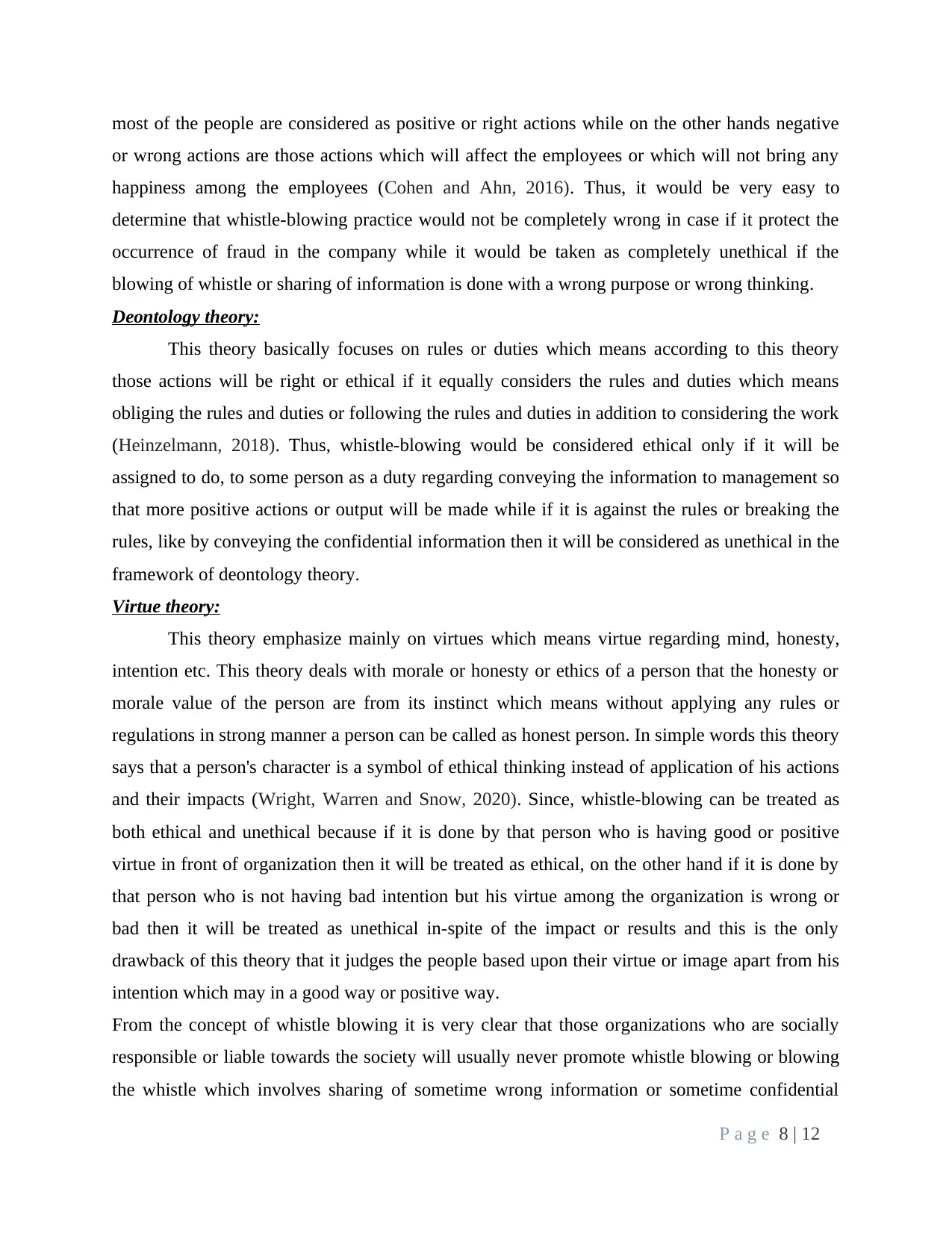
most of the people are considered as positive or right actions while on the other hands negative
or wrong actions are those actions which will affect the employees or which will not bring any
happiness among the employees (Cohen and Ahn, 2016). Thus, it would be very easy to
determine that whistle-blowing practice would not be completely wrong in case if it protect the
occurrence of fraud in the company while it would be taken as completely unethical if the
blowing of whistle or sharing of information is done with a wrong purpose or wrong thinking.
Deontology theory:
This theory basically focuses on rules or duties which means according to this theory
those actions will be right or ethical if it equally considers the rules and duties which means
obliging the rules and duties or following the rules and duties in addition to considering the work
(Heinzelmann, 2018). Thus, whistle-blowing would be considered ethical only if it will be
assigned to do, to some person as a duty regarding conveying the information to management so
that more positive actions or output will be made while if it is against the rules or breaking the
rules, like by conveying the confidential information then it will be considered as unethical in the
framework of deontology theory.
Virtue theory:
This theory emphasize mainly on virtues which means virtue regarding mind, honesty,
intention etc. This theory deals with morale or honesty or ethics of a person that the honesty or
morale value of the person are from its instinct which means without applying any rules or
regulations in strong manner a person can be called as honest person. In simple words this theory
says that a person's character is a symbol of ethical thinking instead of application of his actions
and their impacts (Wright, Warren and Snow, 2020). Since, whistle-blowing can be treated as
both ethical and unethical because if it is done by that person who is having good or positive
virtue in front of organization then it will be treated as ethical, on the other hand if it is done by
that person who is not having bad intention but his virtue among the organization is wrong or
bad then it will be treated as unethical in-spite of the impact or results and this is the only
drawback of this theory that it judges the people based upon their virtue or image apart from his
intention which may in a good way or positive way.
From the concept of whistle blowing it is very clear that those organizations who are socially
responsible or liable towards the society will usually never promote whistle blowing or blowing
the whistle which involves sharing of sometime wrong information or sometime confidential
P a g e 8 | 12
or wrong actions are those actions which will affect the employees or which will not bring any
happiness among the employees (Cohen and Ahn, 2016). Thus, it would be very easy to
determine that whistle-blowing practice would not be completely wrong in case if it protect the
occurrence of fraud in the company while it would be taken as completely unethical if the
blowing of whistle or sharing of information is done with a wrong purpose or wrong thinking.
Deontology theory:
This theory basically focuses on rules or duties which means according to this theory
those actions will be right or ethical if it equally considers the rules and duties which means
obliging the rules and duties or following the rules and duties in addition to considering the work
(Heinzelmann, 2018). Thus, whistle-blowing would be considered ethical only if it will be
assigned to do, to some person as a duty regarding conveying the information to management so
that more positive actions or output will be made while if it is against the rules or breaking the
rules, like by conveying the confidential information then it will be considered as unethical in the
framework of deontology theory.
Virtue theory:
This theory emphasize mainly on virtues which means virtue regarding mind, honesty,
intention etc. This theory deals with morale or honesty or ethics of a person that the honesty or
morale value of the person are from its instinct which means without applying any rules or
regulations in strong manner a person can be called as honest person. In simple words this theory
says that a person's character is a symbol of ethical thinking instead of application of his actions
and their impacts (Wright, Warren and Snow, 2020). Since, whistle-blowing can be treated as
both ethical and unethical because if it is done by that person who is having good or positive
virtue in front of organization then it will be treated as ethical, on the other hand if it is done by
that person who is not having bad intention but his virtue among the organization is wrong or
bad then it will be treated as unethical in-spite of the impact or results and this is the only
drawback of this theory that it judges the people based upon their virtue or image apart from his
intention which may in a good way or positive way.
From the concept of whistle blowing it is very clear that those organizations who are socially
responsible or liable towards the society will usually never promote whistle blowing or blowing
the whistle which involves sharing of sometime wrong information or sometime confidential
P a g e 8 | 12
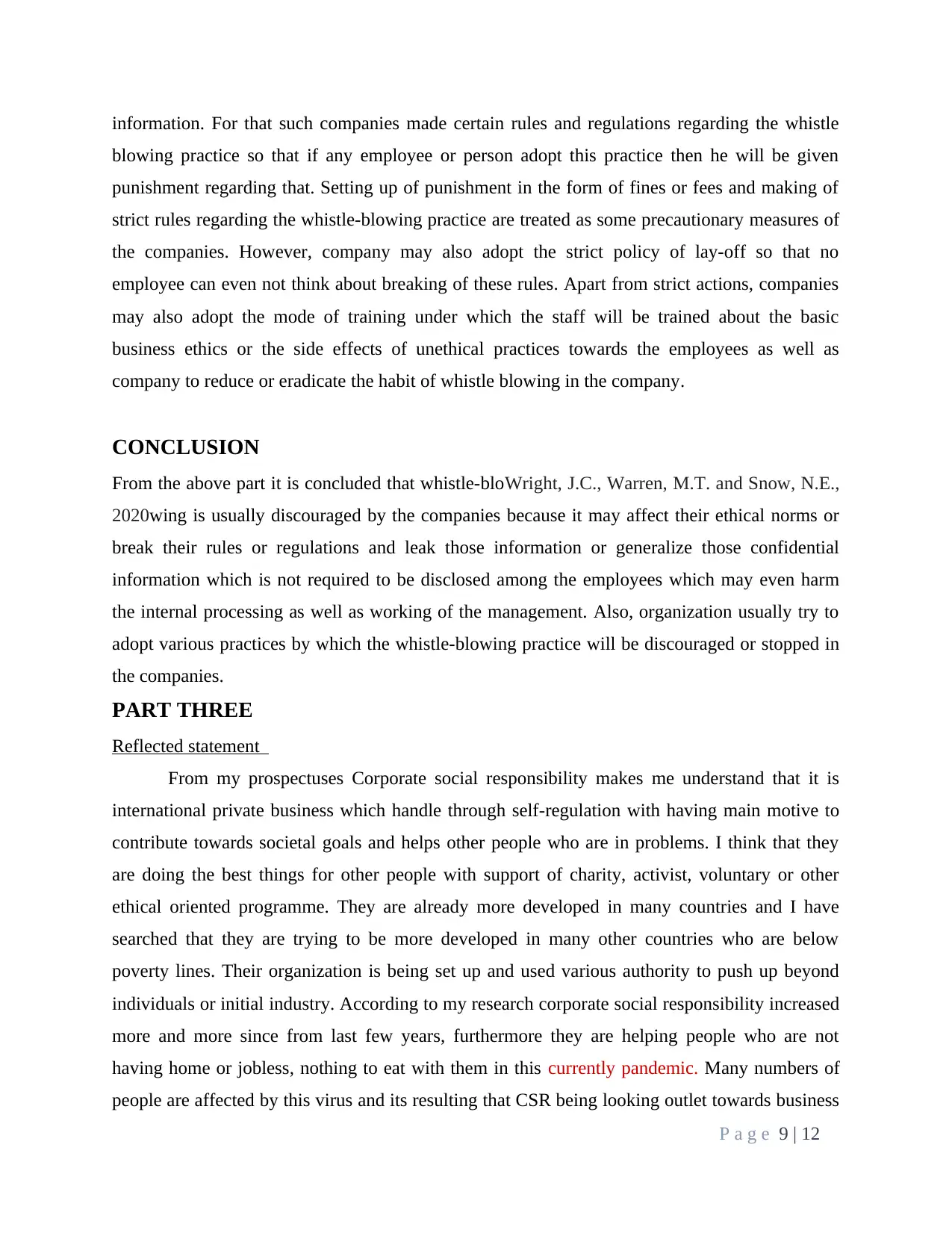
information. For that such companies made certain rules and regulations regarding the whistle
blowing practice so that if any employee or person adopt this practice then he will be given
punishment regarding that. Setting up of punishment in the form of fines or fees and making of
strict rules regarding the whistle-blowing practice are treated as some precautionary measures of
the companies. However, company may also adopt the strict policy of lay-off so that no
employee can even not think about breaking of these rules. Apart from strict actions, companies
may also adopt the mode of training under which the staff will be trained about the basic
business ethics or the side effects of unethical practices towards the employees as well as
company to reduce or eradicate the habit of whistle blowing in the company.
CONCLUSION
From the above part it is concluded that whistle-bloWright, J.C., Warren, M.T. and Snow, N.E.,
2020wing is usually discouraged by the companies because it may affect their ethical norms or
break their rules or regulations and leak those information or generalize those confidential
information which is not required to be disclosed among the employees which may even harm
the internal processing as well as working of the management. Also, organization usually try to
adopt various practices by which the whistle-blowing practice will be discouraged or stopped in
the companies.
PART THREE
Reflected statement
From my prospectuses Corporate social responsibility makes me understand that it is
international private business which handle through self-regulation with having main motive to
contribute towards societal goals and helps other people who are in problems. I think that they
are doing the best things for other people with support of charity, activist, voluntary or other
ethical oriented programme. They are already more developed in many countries and I have
searched that they are trying to be more developed in many other countries who are below
poverty lines. Their organization is being set up and used various authority to push up beyond
individuals or initial industry. According to my research corporate social responsibility increased
more and more since from last few years, furthermore they are helping people who are not
having home or jobless, nothing to eat with them in this currently pandemic. Many numbers of
people are affected by this virus and its resulting that CSR being looking outlet towards business
P a g e 9 | 12
blowing practice so that if any employee or person adopt this practice then he will be given
punishment regarding that. Setting up of punishment in the form of fines or fees and making of
strict rules regarding the whistle-blowing practice are treated as some precautionary measures of
the companies. However, company may also adopt the strict policy of lay-off so that no
employee can even not think about breaking of these rules. Apart from strict actions, companies
may also adopt the mode of training under which the staff will be trained about the basic
business ethics or the side effects of unethical practices towards the employees as well as
company to reduce or eradicate the habit of whistle blowing in the company.
CONCLUSION
From the above part it is concluded that whistle-bloWright, J.C., Warren, M.T. and Snow, N.E.,
2020wing is usually discouraged by the companies because it may affect their ethical norms or
break their rules or regulations and leak those information or generalize those confidential
information which is not required to be disclosed among the employees which may even harm
the internal processing as well as working of the management. Also, organization usually try to
adopt various practices by which the whistle-blowing practice will be discouraged or stopped in
the companies.
PART THREE
Reflected statement
From my prospectuses Corporate social responsibility makes me understand that it is
international private business which handle through self-regulation with having main motive to
contribute towards societal goals and helps other people who are in problems. I think that they
are doing the best things for other people with support of charity, activist, voluntary or other
ethical oriented programme. They are already more developed in many countries and I have
searched that they are trying to be more developed in many other countries who are below
poverty lines. Their organization is being set up and used various authority to push up beyond
individuals or initial industry. According to my research corporate social responsibility increased
more and more since from last few years, furthermore they are helping people who are not
having home or jobless, nothing to eat with them in this currently pandemic. Many numbers of
people are affected by this virus and its resulting that CSR being looking outlet towards business
P a g e 9 | 12
⊘ This is a preview!⊘
Do you want full access?
Subscribe today to unlock all pages.

Trusted by 1+ million students worldwide
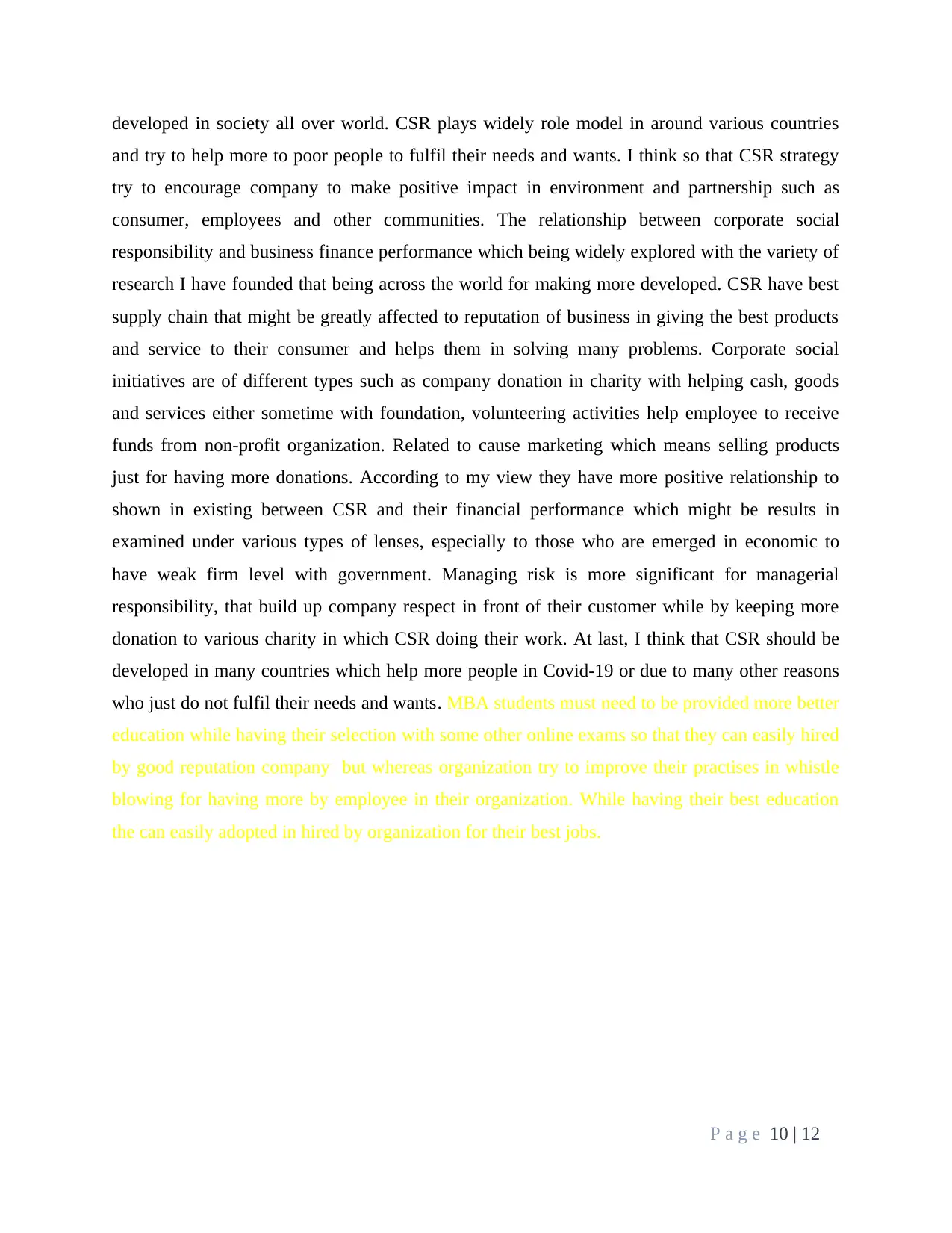
developed in society all over world. CSR plays widely role model in around various countries
and try to help more to poor people to fulfil their needs and wants. I think so that CSR strategy
try to encourage company to make positive impact in environment and partnership such as
consumer, employees and other communities. The relationship between corporate social
responsibility and business finance performance which being widely explored with the variety of
research I have founded that being across the world for making more developed. CSR have best
supply chain that might be greatly affected to reputation of business in giving the best products
and service to their consumer and helps them in solving many problems. Corporate social
initiatives are of different types such as company donation in charity with helping cash, goods
and services either sometime with foundation, volunteering activities help employee to receive
funds from non-profit organization. Related to cause marketing which means selling products
just for having more donations. According to my view they have more positive relationship to
shown in existing between CSR and their financial performance which might be results in
examined under various types of lenses, especially to those who are emerged in economic to
have weak firm level with government. Managing risk is more significant for managerial
responsibility, that build up company respect in front of their customer while by keeping more
donation to various charity in which CSR doing their work. At last, I think that CSR should be
developed in many countries which help more people in Covid-19 or due to many other reasons
who just do not fulfil their needs and wants. MBA students must need to be provided more better
education while having their selection with some other online exams so that they can easily hired
by good reputation company but whereas organization try to improve their practises in whistle
blowing for having more by employee in their organization. While having their best education
the can easily adopted in hired by organization for their best jobs.
P a g e 10 | 12
and try to help more to poor people to fulfil their needs and wants. I think so that CSR strategy
try to encourage company to make positive impact in environment and partnership such as
consumer, employees and other communities. The relationship between corporate social
responsibility and business finance performance which being widely explored with the variety of
research I have founded that being across the world for making more developed. CSR have best
supply chain that might be greatly affected to reputation of business in giving the best products
and service to their consumer and helps them in solving many problems. Corporate social
initiatives are of different types such as company donation in charity with helping cash, goods
and services either sometime with foundation, volunteering activities help employee to receive
funds from non-profit organization. Related to cause marketing which means selling products
just for having more donations. According to my view they have more positive relationship to
shown in existing between CSR and their financial performance which might be results in
examined under various types of lenses, especially to those who are emerged in economic to
have weak firm level with government. Managing risk is more significant for managerial
responsibility, that build up company respect in front of their customer while by keeping more
donation to various charity in which CSR doing their work. At last, I think that CSR should be
developed in many countries which help more people in Covid-19 or due to many other reasons
who just do not fulfil their needs and wants. MBA students must need to be provided more better
education while having their selection with some other online exams so that they can easily hired
by good reputation company but whereas organization try to improve their practises in whistle
blowing for having more by employee in their organization. While having their best education
the can easily adopted in hired by organization for their best jobs.
P a g e 10 | 12
Paraphrase This Document
Need a fresh take? Get an instant paraphrase of this document with our AI Paraphraser
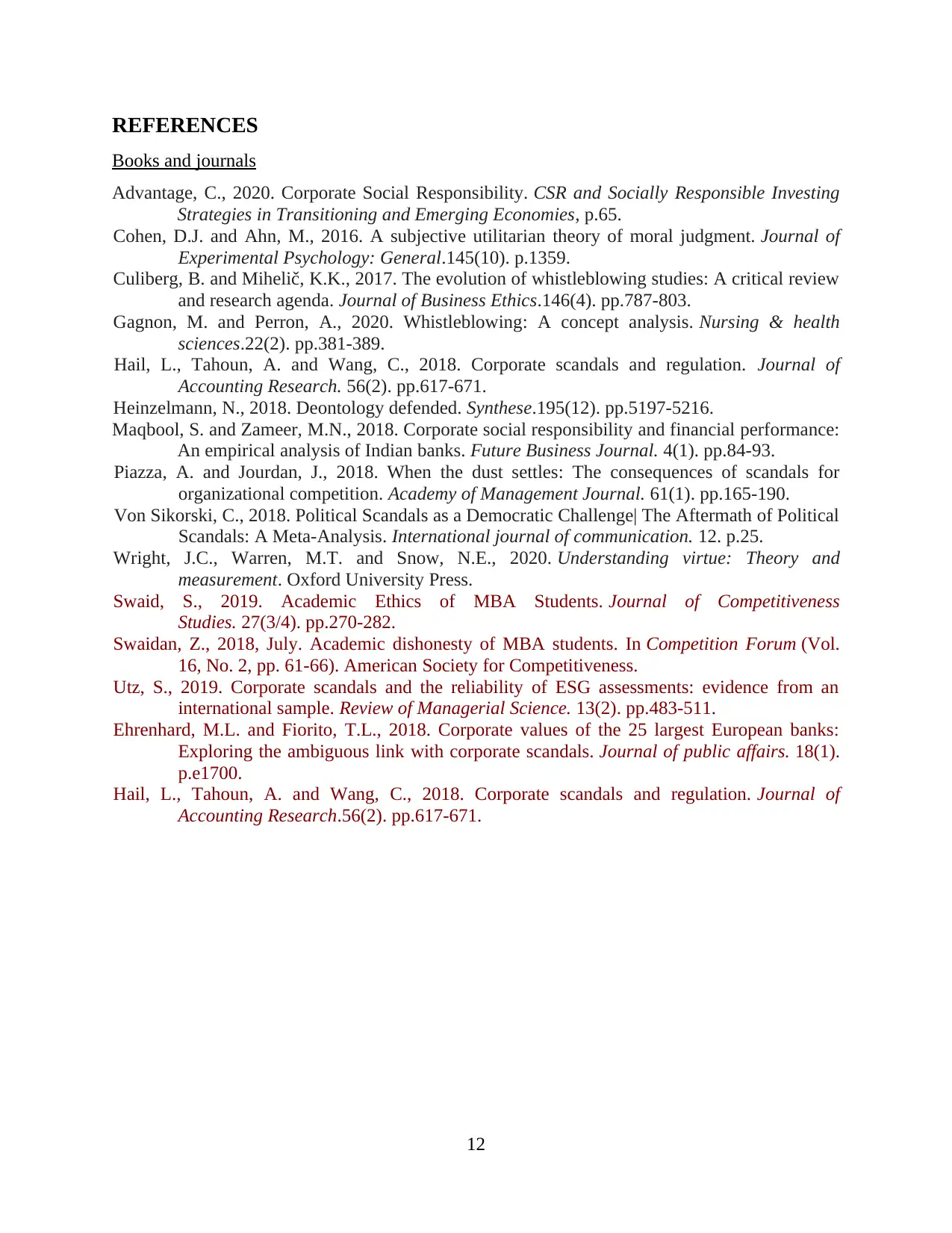
REFERENCES
Books and journals
Advantage, C., 2020. Corporate Social Responsibility. CSR and Socially Responsible Investing
Strategies in Transitioning and Emerging Economies, p.65.
Cohen, D.J. and Ahn, M., 2016. A subjective utilitarian theory of moral judgment. Journal of
Experimental Psychology: General.145(10). p.1359.
Culiberg, B. and Mihelič, K.K., 2017. The evolution of whistleblowing studies: A critical review
and research agenda. Journal of Business Ethics.146(4). pp.787-803.
Gagnon, M. and Perron, A., 2020. Whistleblowing: A concept analysis. Nursing & health
sciences.22(2). pp.381-389.
Hail, L., Tahoun, A. and Wang, C., 2018. Corporate scandals and regulation. Journal of
Accounting Research. 56(2). pp.617-671.
Heinzelmann, N., 2018. Deontology defended. Synthese.195(12). pp.5197-5216.
Maqbool, S. and Zameer, M.N., 2018. Corporate social responsibility and financial performance:
An empirical analysis of Indian banks. Future Business Journal. 4(1). pp.84-93.
Piazza, A. and Jourdan, J., 2018. When the dust settles: The consequences of scandals for
organizational competition. Academy of Management Journal. 61(1). pp.165-190.
Von Sikorski, C., 2018. Political Scandals as a Democratic Challenge| The Aftermath of Political
Scandals: A Meta-Analysis. International journal of communication. 12. p.25.
Wright, J.C., Warren, M.T. and Snow, N.E., 2020. Understanding virtue: Theory and
measurement. Oxford University Press.
Swaid, S., 2019. Academic Ethics of MBA Students. Journal of Competitiveness
Studies. 27(3/4). pp.270-282.
Swaidan, Z., 2018, July. Academic dishonesty of MBA students. In Competition Forum (Vol.
16, No. 2, pp. 61-66). American Society for Competitiveness.
Utz, S., 2019. Corporate scandals and the reliability of ESG assessments: evidence from an
international sample. Review of Managerial Science. 13(2). pp.483-511.
Ehrenhard, M.L. and Fiorito, T.L., 2018. Corporate values of the 25 largest European banks:
Exploring the ambiguous link with corporate scandals. Journal of public affairs. 18(1).
p.e1700.
Hail, L., Tahoun, A. and Wang, C., 2018. Corporate scandals and regulation. Journal of
Accounting Research.56(2). pp.617-671.
12
Books and journals
Advantage, C., 2020. Corporate Social Responsibility. CSR and Socially Responsible Investing
Strategies in Transitioning and Emerging Economies, p.65.
Cohen, D.J. and Ahn, M., 2016. A subjective utilitarian theory of moral judgment. Journal of
Experimental Psychology: General.145(10). p.1359.
Culiberg, B. and Mihelič, K.K., 2017. The evolution of whistleblowing studies: A critical review
and research agenda. Journal of Business Ethics.146(4). pp.787-803.
Gagnon, M. and Perron, A., 2020. Whistleblowing: A concept analysis. Nursing & health
sciences.22(2). pp.381-389.
Hail, L., Tahoun, A. and Wang, C., 2018. Corporate scandals and regulation. Journal of
Accounting Research. 56(2). pp.617-671.
Heinzelmann, N., 2018. Deontology defended. Synthese.195(12). pp.5197-5216.
Maqbool, S. and Zameer, M.N., 2018. Corporate social responsibility and financial performance:
An empirical analysis of Indian banks. Future Business Journal. 4(1). pp.84-93.
Piazza, A. and Jourdan, J., 2018. When the dust settles: The consequences of scandals for
organizational competition. Academy of Management Journal. 61(1). pp.165-190.
Von Sikorski, C., 2018. Political Scandals as a Democratic Challenge| The Aftermath of Political
Scandals: A Meta-Analysis. International journal of communication. 12. p.25.
Wright, J.C., Warren, M.T. and Snow, N.E., 2020. Understanding virtue: Theory and
measurement. Oxford University Press.
Swaid, S., 2019. Academic Ethics of MBA Students. Journal of Competitiveness
Studies. 27(3/4). pp.270-282.
Swaidan, Z., 2018, July. Academic dishonesty of MBA students. In Competition Forum (Vol.
16, No. 2, pp. 61-66). American Society for Competitiveness.
Utz, S., 2019. Corporate scandals and the reliability of ESG assessments: evidence from an
international sample. Review of Managerial Science. 13(2). pp.483-511.
Ehrenhard, M.L. and Fiorito, T.L., 2018. Corporate values of the 25 largest European banks:
Exploring the ambiguous link with corporate scandals. Journal of public affairs. 18(1).
p.e1700.
Hail, L., Tahoun, A. and Wang, C., 2018. Corporate scandals and regulation. Journal of
Accounting Research.56(2). pp.617-671.
12

12
⊘ This is a preview!⊘
Do you want full access?
Subscribe today to unlock all pages.

Trusted by 1+ million students worldwide
1 out of 12
Related Documents
Your All-in-One AI-Powered Toolkit for Academic Success.
+13062052269
info@desklib.com
Available 24*7 on WhatsApp / Email
![[object Object]](/_next/static/media/star-bottom.7253800d.svg)
Unlock your academic potential
Copyright © 2020–2026 A2Z Services. All Rights Reserved. Developed and managed by ZUCOL.




